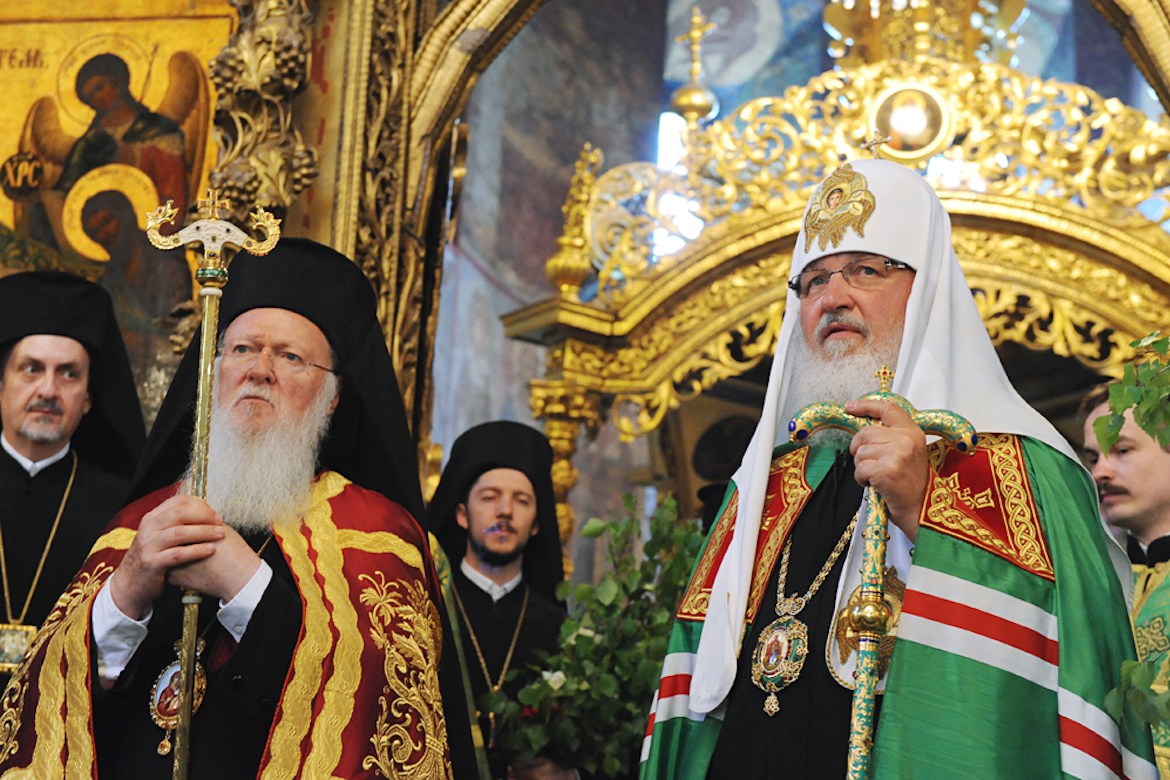
The Christian ecumenism process that AVİM has drawn attention to in its various articles[1] has come under the risk of being disrupted due to a recent important development; there is the possibility that the Ukrainian Orthodox Church - Kiev Patriarchate may attain autocephaly (the status of a church being administratively independent from other churches) and this possibility has caused a confrontation between two Eastern Orthodox churches – the Greek Patriarchate of Istanbul (Constantinople) and the Moscow Patriarchate. While this development may at first glance seem solely a religious issue, it in fact has political dimensions as well. However, before delving into such matters, it would be beneficial to remind the reader what “ecumenism” means in the context of the Christianity.
One of the three Abrahamic religions, Christianity has, in the course of time, separated into three main branches due to theological disputes and political conflicts: Catholicism, Orthodoxy, and Protestantism. While Catholic Christianity is represented by a single church institution (the Roman Catholic Church), Orthodox and Protestant Christianity are represented by different churches as a reflection of different religious movements and political formations. Despite all their disagreements and differences, these various churches endeavor to emphasize their commonalities and seek to maintain cooperation amongst each other. This partnership and cooperation process, which has no centralized management, is known as ecumenism. A more detailed explanation for ecumenism is as follows:
“… To put it briefly, we use this term [ecumenism] in the way it was used in the Second Vatican Council and by those who officially brought it to use in Catholic theology, within solely a Christian context, and in a solely theological meaning. Ecumenism… for us only means unitatis redintegratio (the re-establishment of unity); in other words, the re-constitution of the unity that originates between Jesus Christ and those who have been baptized, but which has become endangered or broken down within the course of time. Therefore, ecumenism is neither solely “peaceableness”, “dialogue”, nor “meeting”, and furthermore, neither is it “tolerance” (rather, the term tolerance carrying a “negative” quality takes on a positive quality [inversely] proportional to the “sternness” of the human heart); while ecumenism contains all of these, it rests upon the mystical truth of Christianity and, for this reason, it is defined through the fundamental connection that Christians establish with the mystique of Jesus Christ.
While the propensity for unitatis redintegratio defines ecumenism through its teleology and the tension it creates within the body of the church, overcoming the apparent different orientations to reach the underlying unity, this main principle, may be evaluated as the fundamental methodology of being ecumenical.”[2]
Different examples can be given for activities meant to further ecumenism in the Christian world: a) the activities carried within the structure of the World Council of Churches (the largest Christian organization in the world),[3] b) the relations between the World Council of Churches and the Roman Catholic Church (the largest church in the world), c) the organization of a new “Holy and Great Council” (despite the lack of full attendance) in 2016 in Crete by Eastern Orthodox Churches 1200 years after the previous one,[4] d) the meeting held between Pope Francis (the spiritual leader of the Roman Catholic Church) and Patriarch Kirill (the spiritual leader of the Russian Orthodox Church/Moscow Patriarchate, the largest Orthodox church in the world) in 2016 in Cuba,[5] e) as an example of interest to Turkey: the unquestioned support shown in the past by the World Council of Churches and Pope Francis towards the Armenian genocide narrative.[6]
Leaving aside these developments that may be deemed positive for the Christian world, disagreements that go on to spark crises occur as well between various churches. The most important crisis in the agenda right now is the one between the Greek Patriarchate of Istanbul (Constantinople) and the Moscow Patriarchate over the issue of Ukraine. It will beneficial to introduce both churches before proceeding to the details of the crisis.
There are 14 autocephalous (administratively independent) Eastern Orthodox churches in the world. By Orthodox tradition, the Greek Patriarchate of Istanbul is considered to be first among equals (primus inter pares), however, what this means for the Eastern Orthodox world and what kind of relations Eastern Orthodox churches should establish with churches of other Christian denominations are matters of discussion. Apart from being considered the center of the Eastern Orthodox world, within the context of the verbal agreement reached during the Lausanne Peace Conference (the agreement was recorded in the proceedings of the Conference) that shaped the 1923 Lausanne Peace Treaty, the Greek Patriarchate of Istanbul is a Turkish institution.[7] Even though the Greek Patriarchate of Istanbul introduces itself as the “Ecumenical (Universal) Patriarchate”, Turkey has never recognized this title due to national interest considerations, since the recognition of such a title would turn the Patriarchate to “a state within a state” (as is the case in the example of the Roman Catholic Church – Italy). The Patriarchate functions within the administration of the District Governorship of Eyüp/Istanbul and serves the religious needs of the Greek community of Turkey. Greek Patriarchs of Istanbul (currently, Bartholomew I) are elected from amongst Turkish citizens. Finally, we must bring to attention a rather odd omission: the Greek Patriarchate of Istanbul, considered to be a Turkish institution, lacks a Turkish-language official website despite having Greek, English, and French versions of its website.[8]
Meanwhile, the Moscow Patriarchate is the largest Orthodox church in the world based on the congregation falling under its religious jurisdiction. The Moscow Patriarchate has always seen the Greek Patriarchate of Istanbul as its rival. While the Moscow Patriarchate recognizes the first among equals status of the Greek Patriarchate of Istanbul, it argues that this status is merely an honorary title. And throughout history, indicating that the first Rome (Rome – the Roman Catholic Church) had “become degenerate” and that the second Rome (Istanbul/Constantinople – the conquest of Istanbul and the collapse of the Byzantium Empire, the vanguard of Christianity, after its against the Ottoman Empire ) had fallen, the Moscow Patriarchate argued Moscow was the third and last Rome and that it was the savior of Christianity.[9] Having suffered from systematic state oppression during the Soviet Union period and having been forced to defend Soviet ideology, the Moscow Patriarchate has now established a symbiotic relationship with the state of the Russian Federation;[10] the Russian state makes use of the moral support provided by the Moscow Patriarchate in its domestic and foreign policies, while the Moscow Patriarchate (utilizing the the power of the Russian state) increases its sphere of influence in Russian society and Slav societies and prevents the spread of foreign-based churches (such as the Protestant churches founded by American Mormon or Jehovah’s Witnesses missionaries) operating in Russia.
Judging by the discourse put forth today by the Moscow Patriarchate, it could be said that the “third Rome” mentality continues onto present day and that some of the activities of the Patriarchate are geared towards damaging the status of the Greek Patriarchate of Istanbul. For example, Moscow Patriarch Kirill, during his meeting with Pope Francis in 2016 in Cuba, gave the impression he was the leader of the Eastern Orthodox world.[11] However, the religious official whose status and power most closely resembles Pope Francis is the Greek Patriarch of Istanbul. To give another example, the Moscow Patriarchate, at the last moment, decided not to attend the “Holy and Great Council” of 2016 that was gathering in Crete under the chairmanship of the Greek Patriarch of Istanbul (three other churches also chose not to attend the Council). In this way, the “pan-Orthodox” and even more so the “ecumenical/universal” attribute of the Council was called into question.[12]
On 7 September 2018, the Greek Patriarchate of Istanbul made a decision that will place the Moscow Patriarchate under difficulty; the Greek Patriarchate of Istanbul announced that it was preparing to grant autocephaly to the Ukrainian Orthodox Church – Kiev Patriarchate.[13] For the completion of the process of granting autocephaly, the Greek Patriarchate of Istanbul appointed two of its religious officials (exarchs) to Kiev in a capacity similar to that of ambassadors.
There are three separate Orthodox churches in Ukraine: the Ukrainian Orthodox Church that is affiliated with the Moscow Patriarchate and adopts a pro-Russian discourse, the Ukrainian Orthodox Church – Kiev Patriarchate (“Kiev Patriarchate” for short) that was established by Ukrainian patriots, and the Ukrainian Autocephalous Orthodox Church -which is another church established by Ukrainian patriots. These three Orthodox churches are the same in terms of religious teachings and rituals, but different in terms of their stance on the issue Ukrainian Orthodox Church’s independence.[14] The Eastern Orthodox world officially recognizes only the Ukrainian Orthodox Church that is affiliated with the Moscow Patriarchate. With the Greek Patriarchate of Istanbul approving the Kiev Patriarchate’s autocephaly, this church will start to be considered separate from the Moscow Patriarchate in the Eastern Orthodox world. As can be understood from the news, with this decision, Kiev Patriarchate and the Ukrainian Autocephalous Orthodox Church will unite and become a single independent Ukrainian Orthodox Church. It has been stated that the Ukrainian Orthodox Church affiliated with the Moscow Patriarchate will naturally be left out of this process and it is being predicted that this church’s congregation will have to start referring to itself as “the Russian Orthodox Church in Ukraine”.[15] If an independent Ukrainian Orthodox Church is established in this way, the Moscow Patriarchate will lose the majority of its congregation and properties (and revenue) in Ukraine and, as a result, will lose its title as the world’s largest Orthodox church.[16]
Since the collapse of the Soviet Union and Ukraine gaining its independence, Ukrainian state officials and patriots have been involved in activities to create a Ukrainian national identity distinct from Russian identity. Up until now, however, these activities had not produced tangible results; Ukrainian people did not or could not perceive themselves as being that different from Russian people. However, after the domestic turmoil that began in Ukraine in 2014 and due to Crimea’s annexation by Russia and the eruption of the separatist movement in eastern Ukraine with Russia’s support, there have been significant changes in Ukraine’s public opinion and a Ukrainian identity distinct from Russian identity has begun to become prominent.
The establishment of an Ukrainian Orthodox Church independent from the Moscow Patriarchate that has recognition in the Eastern Orthodox world come to mean Ukraine’s moral disengagement from Russia (it should be noted that Ukraine has great strategic, political, historical, and cultural importance for Russia). Ukrainian Orthodox people had already begun slowly disengaging from the pro-Russian Ukrainian Orthodox Church and becoming followers of the Kiev Patriarchate due to the conflict in Ukraine.[17] It is being predicted that the Kiev Patriarchate obtaining recognition in the Eastern Orthodox world will convince the Ukrainian Orthodox people hesitating to make a choice and speed up their shift towards the Kiev Patriarchate.[18] Taking all of these into consideration, Ukraine has made attempts in the previous years towards the Greek Patriarchate of Istanbul on both a governmental and a parliamentary level. During a speech this April, the Ukrainian President Petro Poroshenko summarized Ukraine’s stance on this matter with the following words; “this isn’t a religious matter. It isn’t simply a matter of state either. It’s a historic event, when Ukraine’s own church will return home after hundreds of years.”[19] Apart from Ukrainian politicians, this issue is also important for Ukrainian public opinion, because even for the Ukrainians who do not describe themselves as being as religious, Orthodoxy is an important part of Ukrainian national identity and, in this respect, it has become a necessity to have a Ukrainian Orthodox Church independent of a Russia that is beginning to be perceived as a rival (and sometimes as an enemy). Terms such as autocephaly and tomos (religious decree – in this regard, the declaration of the granting of autocephaly) have become commonly used in Ukrainian press and amongst Ukrainian people.[20]
However, despite all these efforts, no positive reply had been received from the Greek Patriarchate of Istanbul regarding this subject up until this year. For example, despite Ukraine’s attempts, this subject was not put on the agenda during the Holy and Great Council organized in 2016. It seems that Ukrainian officials’ attempts of this year have borne positive results. However, it is not known why the Greek Patriarchate of Istanbul has made such a decision this year and not during the previous years. According to one commentary, the Greek Patriarchate of Istanbul has become disturbed by the Moscow Patriarchate’s continuing attempts to obtain more power in the Orthodox world and as such wishes to weaken the Moscow Patriarchate’s power.[21] It is being indicated that the process of granting autocephaly to the Kiev Patriarchate may be completed this October.[22]
In response to these developments, the Moscow Patriarchate’s Chairman of the Department for External Church Relations Metropolitan Hilarion of Volokolamsk issued several statements and the Patriarchate’s Holy Synod held an extraordinary session. Considering the statements of Metropolitan Hilarion[23] and the documents regarding the Holy Synod session,[24] it is understood that the Moscow Patriarchate is discussing the inner functioning and historical development of the church system in the Eastern Orthodox world and is scrutinizing its relations with the Greek Patriarchate of Istanbul.
As it can be guessed, the Moscow Patriarchate is vehemently opposed to the Greek Patriarchate of Istanbul’s decision regarding autocephaly. The Moscow Patriarchate has stated that the Ukrainian Orthodox Church has not made a request for such a decision,[25] that Ukraine is within the Moscow Patriarchate’s religious (canonical) jurisdiction, and that thus the Greek Patriarchate of Istanbul does not have the authority to make such a decision. At the same time, the Moscow Patriarchate has stated that if the Greek Patriarchate of Istanbul insists on finalizing its decision, the Moscow Patriarchate will have no other choice but to completely sever the relations between the two churches.[26] Hence, in the latest statement made by the Moscow Patriarchate, it has been expressed that diplomatic options have been depleted in this dispute and for this reason it has been decided to freeze the Moscow Patriarchate’s relations with the Greek Patriarchate of Istanbul. The Moscow Patriarchate has stated that the Greek Patriarch of Istanbul Bartholomew I will no longer be prayed for during Moscow Patriarchate’s religious ceremonies and that no attendance will be made to meetings organized by the Greek Patriarchate of Istanbul.[27] Moreover, the Patriarchate has implied that it is now questioning the validity of the Greek Patriarchate of Istanbul’s status as the first among the equals.[28] Finally, the Patriarchate has argued that if a diplomatic reconciliation cannot be achieved with the Greek Patriarchate of Istanbul in this process, it may lead to consequences similar to that of the inter-church Great Schism of 1054.[29]
The Greek Patriarchate of Istanbul has responded to the Moscow Patriarchate’s criticisms and elaborated on its autocephaly decision through a recently published newspaper interview. Concerning this issue, the Patriarchate stated:
“… It is, therefore, within the duties of the Ecumenical Patriarchate to determine when it is time for a Church to become autocephalous. In this determination, our Patriarchate always maintains the same criteria: The Church must be based in an independent state, while the petition for autocephaly must be made by that church and state. In the case of Ukraine, our Patriarchate is doing exactly the same as it has done in all other cases. Consequently, the reaction of the Moscow Patriarchate cannot be interpreted with ecclesiastical criteria…”[30]
The Greek Patriarchate of Istanbul continued by stating that the Moscow Patriarchate acts in concert with the Russian state, and thus accused the Moscow Patriarchate of carrying out policies based on worldly considerations instead of “spiritual and ecclesiastical criteria”. Finally, the Patriarchate accused the Moscow Patriarchate of behaving in way that threatens to break the unity amongst Eastern Orthodox churches. It seems that, based on their conflicting perspectives and goals, the Greek Patriarchate of Istanbul and the Moscow Patriarchate are accusing each other of the same thing; of being the party responsible for jeopardizing the Eastern Orthodox world’s unity.
The Russian government has not reacted like the Moscow Patriarchate regarding this situation, however, there is no doubt that it is closely following the situation. As it has been stated before, the moral support of the Moscow Patriarchate is important for Russia’s domestic and foreign policies. Any change in the power and prestige of the Moscow Patriarchate will have reflections on Russia. Moreover, Russia has been suspicious of the Greek Patriarchate of Istanbul throughout history. During the Cold War period, the Greek Patriarchate of Istanbul was seen by the Western bloc countries as a sort of “fortress” providing defense against the policies and ideology espoused by the Soviet Union. Indeed, the Greek Patriarchate of Istanbul, through its discourse, did take a stance against the Soviet Union. In a time when Russia is experiencing various disputes with Western countries, according to comments in the international media, the Greek Patriarch of Istanbul Bartholomew I is “absolutely Western-oriented, pro-American and at the same time pro-Turkish” in the eyes of the Russian government.[31] It can be speculated that the recent support shown by the United States for the Greek Patriarchate of Istanbul’s autocephaly decision and Western media outlets already beginning to comment that this decision signifies a major blow to Russia’s power will intensify Russia’s negative stance towards the Greek Patriarchate of Istanbul. For now, it is not known what Russia’s response will be to this development.
While religious doctrine arguments rage on about the issue of the establishment of a Ukrainian Orthodox Church independent from the Moscow Patriarchate, as it can be understood from what has been explained above, this situation also has political dimensions. Even though the Greek Patriarchate of Istanbul’s activities in the Orthodox world regarding religious matters do not directly concern Turkey, the political consequences that these activities may create will concern Turkey. Therefore, it will be beneficial for Turkish officials and public to follow this matter closely so that Turkey will be better prepared for the political developments that may occur as a result of this matter.[32]
* Photograph: http://www.pappaspost.com (the Greek Patriarch of Istanbul Bartholomew I on the left, the Moscow Patriarch Kirill on the right)
[1] Mehmet Oğuzhan Tulun, “What Is the World Council of Churches?” Center for Eurasian Studies (AVİM), Commentary No: 2014/34, March 6, 2014, https://avim.org.tr/en/Yorum/WHAT-IS-THE-WORLD-COUNCIL-OF-CHURCHES ; Mehmet Oğuzhan Tulun, “Religion And Double Standards,” Center for Eurasian Studies (AVİM), Commentary No: 2016/24, April 20, 2016, https://avim.org.tr/en/Yorum/RELIGION-AND-DOUBLE-STANDARDS ; Mehmet Oğuzhan Tulun, “Pope Francis’ Push for Ecumenism,” Center for Eurasian Studies (AVİM), Commentary No: 2016/38, June 28, 2016, https://avim.org.tr/en/Yorum/POPE-FRANCIS-PUSH-FOR-ECUMENISM
[2] Boğos Levon Zekiyan, Kayıp Kentten Manevi Vatana – Ermeni tarihine toplu bir bakış denemesi (İstanbul: Aras Yayıncılık, 2018), p. 96-97.
[3] Tulun, “What Is the World Council of Churches?”
[4] Mehmet Oğuzhan Tulun, “Orthodox Council to Meet After 1200 Years,” Center for Eurasian Studies (AVİM), Commentary No: 2014/48, April 9, 2014, https://avim.org.tr/en/Yorum/ORTHODOX-COUNCIL-TO-MEET-AFTER-1200-YEARS ; “Orthodox Churches council opens on Crete despite Russia's absence,” BBC, June 19, 2016, https://www.bbc.com/news/world-europe-36569416
[5] Mehmet Oğuzhan Tulun, “Some Comments on the Joint Declaration of Pope Francis and Patriarch Kirill,” Center for Eurasian Studies (AVİM), Commentary No: 2016/12, April 21, 2016, https://avim.org.tr/en/Yorum/SOME-COMMENTS-ON-THE-JOINT-DECLARATION-OF-POPE-FRANCIS-AND-PATRIARCH-KIRILL
[6] Tulun, “What Is the World Council of Churches?” ; Mehmet Oğuzhan Tulun, “Introducing Religion into a Legal and Historical Dispute,” Center for Eurasian Studies (AVİM), Commentary No: 2015/45, April 12, 2015, https://avim.org.tr/en/Yorum/INTRODUCING-RELIGION-INTO-A-LEGAL-AND-HISTORICAL-DISPUTE
[7] The Grand National Assembly of Turkey (GNAT), having been very troubled by the activities the Greek Patriarchate of Istanbul had been involved in the during the last period of the Ottoman Empire, wanted the Patriarchate to be moved out its territory to somewhere else (such as Mount Athos in Greece, which is of spiritual importance for Orthodox Christianity). However, the Western countries that participated in the Lausanne Peace Conference were strongly against GNAT’s demand. In the end, GNAT and the Western countries reached a compromise; the Greek Patriarchate of Istanbul would remain as a Turkish institution solely involved in religious affairs and Turkey would not recognize “ecumenical” adjective used by the Patriarchate in its external relations (since GNAT, noting that recognizing the “ecumenical” adjective would result in a state within a state, declared this to be unacceptable). Please see the relevant statement made by İsmet İnönü (who represented GNAT during the Lausanne Peace Conference) in the proceedings of the Conference: Lozan Barış Konferansı - Tutanaklar – Belgeler, Cilt 1, Kitap 1, çevir. Seha L. Meray (Ankara: Ankara Üniversitesi Siyasal Bilgiler Fakültesi Yayınları No. 291), p. 331
[8] The official website of the Greek Patriarchate of Istanbul: https://www.patriarchate.org/
[9] Deniz Berktay, “Fener – Moskova Savaşı’nda Yeni Etap,” Avrasya İncelemeleri Merkezi (AVİM), Blog No: 2018/51, https://avim.org.tr/Blog/FENER-MOSKOVA-SAVASI-NDA-YENI-ETAP
[10] Paul Coyer, “(Un)Holy Alliance: Vladimir Putin, The Russian Orthodox Church And Russian Exceptionalism,” Forbes, May 21, 2015, https://www.forbes.com/sites/paulcoyer/2015/05/21/unholy-alliance-vladimir-putin-and-the-russian-orthodox-church/#6c3d136f27d5 ; Paul Coyer, “The Patriarch, The Pope and An Old Play from Russia's Geopolitical Playbook,” Forbes, March 6, 2016, https://www.forbes.com/sites/paulcoyer/2016/03/06/the-patriarch-the-pope-and-an-old-play-from-russias-geopolitical-playbook/#68f512704f37 ; Christopher Stroop, “Putin Wants God (or at Least the Church) on His Side,” Foreign Policy, September 10, 2018, https://foreignpolicy.com/2018/09/10/putin-wants-god-or-at-least-the-church-on-his-side/
[11] Coyer, “The Patriarch, the Pope and An Old Play from Russia's Geopolitical Playbook.”
[12] “FAQs of the Holy and Great Council,” the official website of the Holy and Great Council – Greek Patriarch of Istanbul, accessed September 18, 2018, https://www.orthodoxcouncil.org/faq
[13] “Announcement of the Ecumenical Patriarchate (7th Sep. 2018),” the Greek Patriarhcate of Istanbul, http://www.ec-patr.org/docdisplay.php?lang=gr&id=2564&tla=gr ; “Ecumenical Patriarchate Appointed Exarchs In Kyiv, In Autocephaly Preparation,” Religious Information Service of Ukraine, September 7, 2018, https://risu.org.ua/en/index/all_news/orthodox/constantinople_patriarchy/72543/
[14] Andrii Fert, “Spiritual capital: why Ukraine is breaking from Russia’s Orthodox Church,” OpenDemocracy.net, September 17, 2018, https://www.opendemocracy.net/od-russia/andrii-fert/spiritual-capital-ukraine-orthodox-church
[15] Fert, “Spiritual capital: why Ukraine is breaking from Russia’s Orthodox Church.”
[16] Taras Kuzio, “Why Independence for Ukraine’s Orthodox Church Is an Earthquake for Putin,” Atlantic Council, September 10, 2018, http://www.atlanticcouncil.org/blogs/ukrainealert/why-independence-for-ukraine-s-orthodox-church-is-an-earthquake-for-putin
[17] Иван Верстюк, “Как приходы Московского патриархата становятся Киевскими,” NV.ua, January 26, 2016, https://nv.ua/publications/kak-prihody-moskovskogo-patriarhata-stanovjatsja-kievskimi-93219.html
[18] Fert, “Spiritual capital: why Ukraine is breaking from Russia’s Orthodox Church.”
[19] Fert, “Spiritual capital: why Ukraine is breaking from Russia’s Orthodox Church.”
[20] Fert, “Spiritual capital: why Ukraine is breaking from Russia’s Orthodox Church.”
[21] Kuzio, “Why Independence for Ukraine’s Orthodox Church Is an Earthquake for Putin.”
[22] Deniz Berktay, “Ortodoks Dünyasında İpler Kopuyor,” Söyledik.com, September 13, 2018, http://soyledik.com/tr/makale/7541/ortodoks-dunyasinda-ipler-kopuyor--deniz-berktay.html
[23] “Metropolitan Hilarion: Current situation creates a threat of schism for Universal Orthodoxy,” The Russian Orthodox Church – Department for External Church Relations, September 8, 2018, https://mospat.ru/en/2018/09/08/news163536/ ; “Metropolitan Hilarion: Patriarch Bartholomew will bear personal responsibility before the judgement of God and the judgement of history,” The Russian Orthodox Church – Department for External Church Relations, September 8, 2018, https://mospat.ru/en/2018/09/08/news163543/ ; “Metropolitan Hilarion: The decision to suspend the liturgical mention of the Patriarch of Constantinople does not imply breaking off the Eucharistic communion,” The Russian Orthodox Church – Department for External Church Relations, September 14, 2018, https://mospat.ru/en/2018/09/14/news163805/
[24] “Statement of the Holy Synod of the Russian Orthodox Church concerning the uncanonical intervention of the Patriarchate of Constantinople in the canonical territory of the Russian Orthodox Church,” The Russian Orthodox Church – Department for External Church Relations, September 14, 2018, https://mospat.ru/en/2018/09/14/news163803/ ; “MINUTES of the Holy Synod’s held on 14 September 2018,” The Russian Orthodox Church – Department for External Church Relations, September 14, 2018, https://mospat.ru/en/2018/09/14/news163817/
[25] “Metropolitan Hilarion: Patriarch Bartholomew will bear personal responsibility before the judgement of God and the judgement of history.” ; “The Will Of Orthodox Christians In Ukraine: Metropolitan Hilarion (Alfeyev) Vs. The Statistics,” OrthodoxyInDialogue.com, September 9, 2018, https://orthodoxyindialogue.com/2018/09/09/the-will-of-orthodox-christians-in-ukraine-metropolitan-hilarion-alfeyev-vs-the-statistics/
[26] “Russian Orthodox Church Threatens To Break Relations With Constantinople Once Autocephaly Is Granted To Orthodox Church In Ukraine,” Religious Information Service of Ukraine, September 10, 2018, https://risu.org.ua/en/index/all_news/confessional/orthodox_relations/72572 ; “Moscow Patriarchate to take tough response if Constantinople takes irreparable steps on Ukraine,” Interfax-Religion.com, September 10, 2018, http://www.interfax-religion.com/?act=news&div=14457
[27] “Holy divorce: Russian Orthodox Church quits Constantinople-led structures,” Unian.info, September 14, 2018, https://www.unian.info/politics/10261308-holy-divorce-russian-orthodox-church-quits-constantinople-led-structures.html ; Claire Heffron, “Russia's Orthodox Church freezes ties with Constantinople over Ukraine,” Euronews, September 15, 2018, https://www.euronews.com/2018/09/15/russia-s-orthodox-church-freezes-ties-with-constantinople-over-ukraine
[28] “Metropolitan Hilarion: The decision to suspend the liturgical mention of the Patriarch of Constantinople does not imply breaking off the Eucharistic communion.”
[29] “Metropolitan Hilarion: Current situation creates a threat of schism for Universal Orthodoxy.”
[30] Ferda Balancar, “Ecumenical Patriarchate's response to Moscow,” Agos, September 21, 2018, http://www.agos.com.tr/en/article/21275/ecumenical-patriarchate-s-response-to-moscow
[31] Coyer, “The Patriarch, The Pope And An Old Play From Russia's Geopolitical Playbook.”
[32] To add as a final development: according to a news report, the subject of an independent Ukrainian Orthodox Church was not on the agenda during the meeting between President of Turkey Recep Tayyip Erdoğan and President of Russia Vladimir Putin in Sochi/Russia last week,: “Kremlin spokesman says Putin, Erdogan did not discuss Ukrainian Church split,” TASS, http://tass.com/politics/1021971
© 2009-2025 Center for Eurasian Studies (AVİM) All Rights Reserved
No comments yet.
-
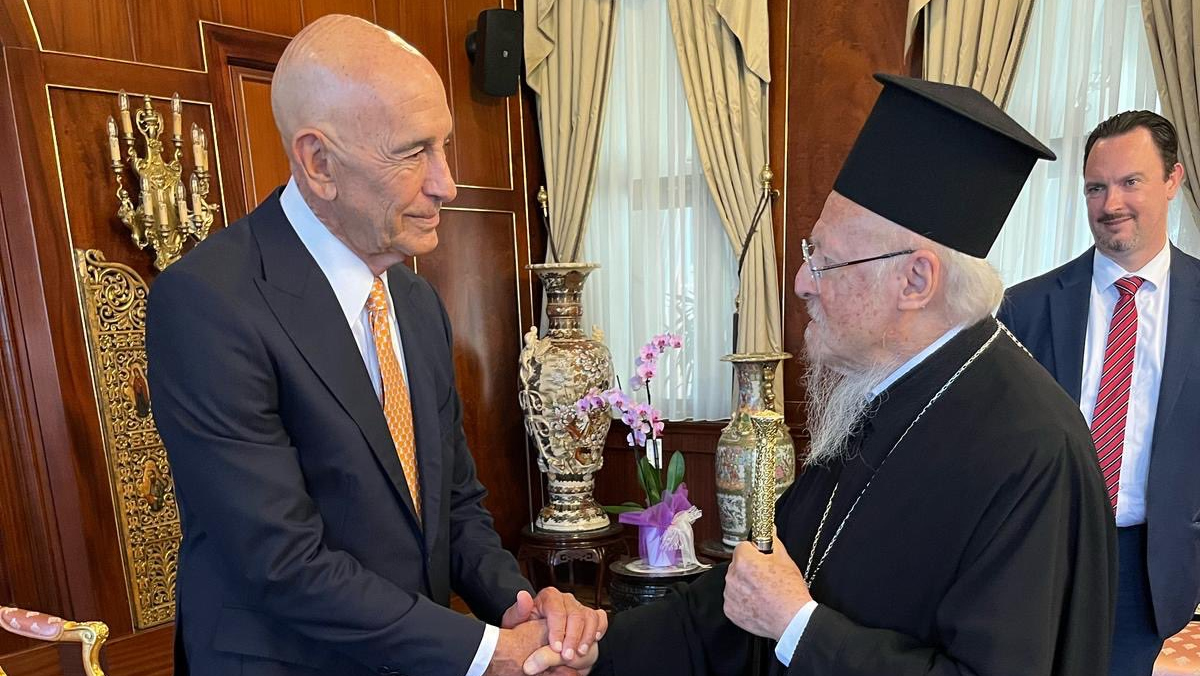 THE HARMFUL EFFECTS OF THE POLITICIZATION OF THE FENER GREEK PATRIARCHATE
THE HARMFUL EFFECTS OF THE POLITICIZATION OF THE FENER GREEK PATRIARCHATE
Mehmet Oğuzhan TULUN 03.09.2025 -
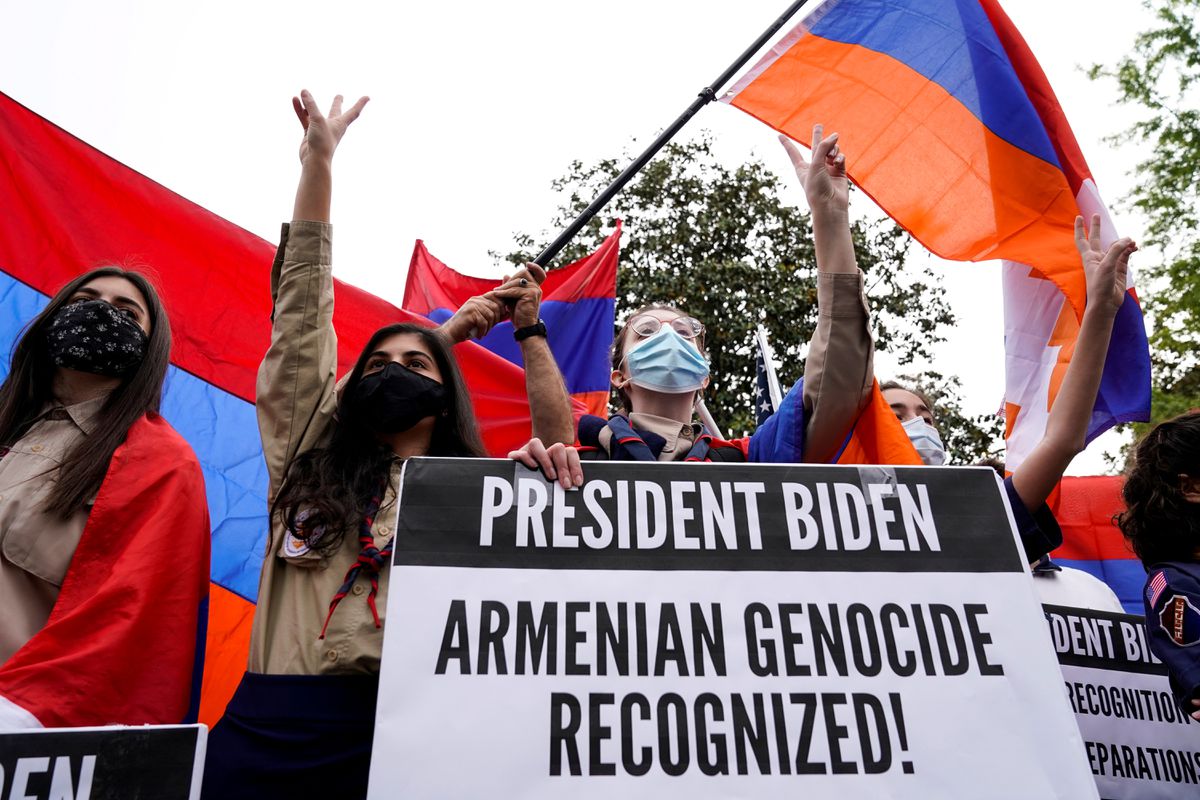 GENOCIDE ACCUSATION AS A FORM OF PUNISHMENT - III
GENOCIDE ACCUSATION AS A FORM OF PUNISHMENT - III
Mehmet Oğuzhan TULUN 27.04.2021 -
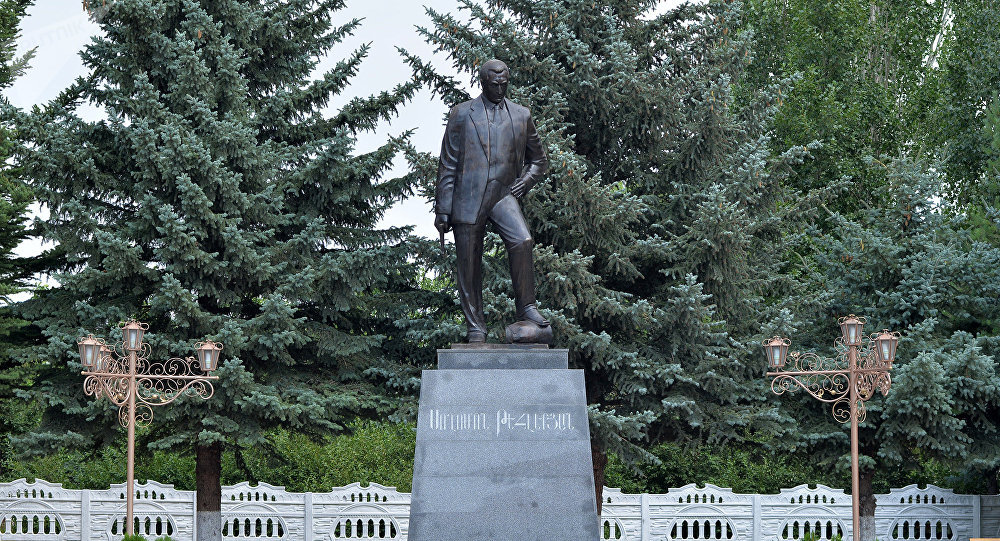 ARMENIA AND THE VENERATION OF TERRORISTS - II
ARMENIA AND THE VENERATION OF TERRORISTS - II
Mehmet Oğuzhan TULUN 16.09.2019 -
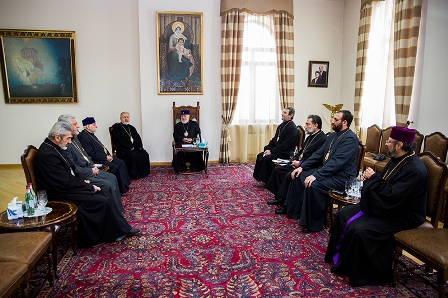 OUTSIDE INTERVENTION TO THE ELECTION OF THE ARMENIAN PATRIARCH OF ISTANBUL
OUTSIDE INTERVENTION TO THE ELECTION OF THE ARMENIAN PATRIARCH OF ISTANBUL
Mehmet Oğuzhan TULUN 15.03.2017 -
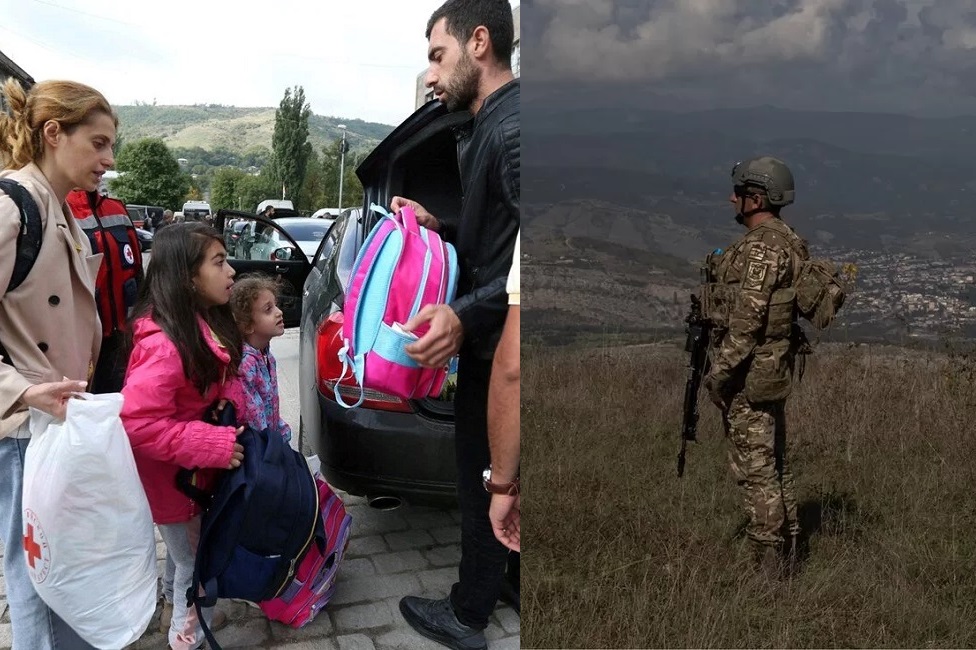 THE BATTLE TO CONTROL THE NARRATIVE OVER KARABAKH: ARMENIAN CIVILIAN SAFETY VS. AZERBAIJANI STATE SOVEREIGNTY
THE BATTLE TO CONTROL THE NARRATIVE OVER KARABAKH: ARMENIAN CIVILIAN SAFETY VS. AZERBAIJANI STATE SOVEREIGNTY
Mehmet Oğuzhan TULUN 06.10.2023
-
 THE VISA OBSTACLE FOR TURKISH CITIZENS AND THE EU'S JUSTIFICATIONS
THE VISA OBSTACLE FOR TURKISH CITIZENS AND THE EU'S JUSTIFICATIONS
Hazel ÇAĞAN ELBİR 10.10.2024 -
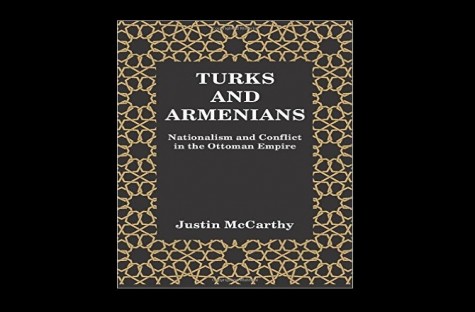 CHAPTER BY CHAPTER SYNOPSIS AND REVIEW OF TURKS AND ARMENIANS: NATIONALISM AND CONFLICT IN THE OTTOMAN EMPIRE BY JUSTIN MCCARTHY - 3
CHAPTER BY CHAPTER SYNOPSIS AND REVIEW OF TURKS AND ARMENIANS: NATIONALISM AND CONFLICT IN THE OTTOMAN EMPIRE BY JUSTIN MCCARTHY - 3
Seher ÇELEN 22.10.2015 -
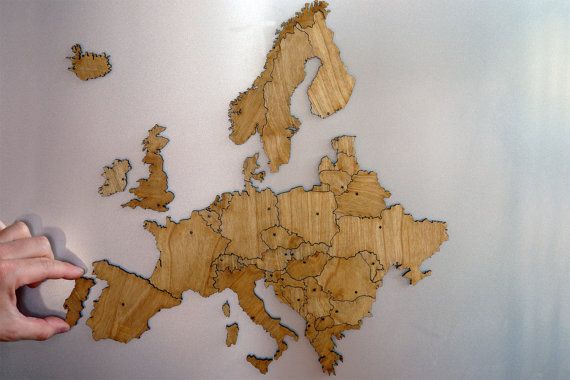 THE RISE OF NATIONALISM IN EUROPE AND SOCIAL DEMOCRATS’ STRUGGLE FOR SURVIVAL
THE RISE OF NATIONALISM IN EUROPE AND SOCIAL DEMOCRATS’ STRUGGLE FOR SURVIVAL
Hazel ÇAĞAN ELBİR 08.02.2017 -
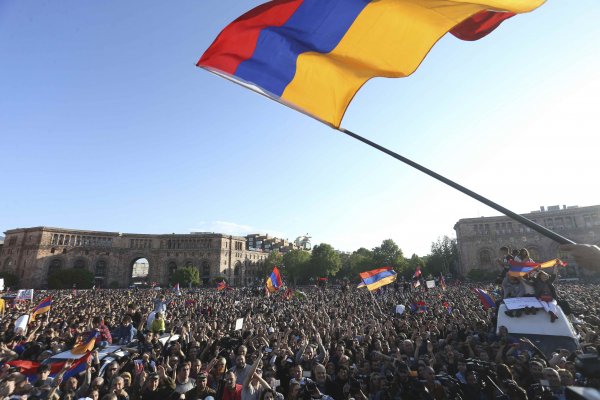 THE RULE STARTED WITH DEMONSTRATIONS ENDED WITH DEMONSTRATIONS
THE RULE STARTED WITH DEMONSTRATIONS ENDED WITH DEMONSTRATIONS
Tutku DİLAVER 14.05.2018 -
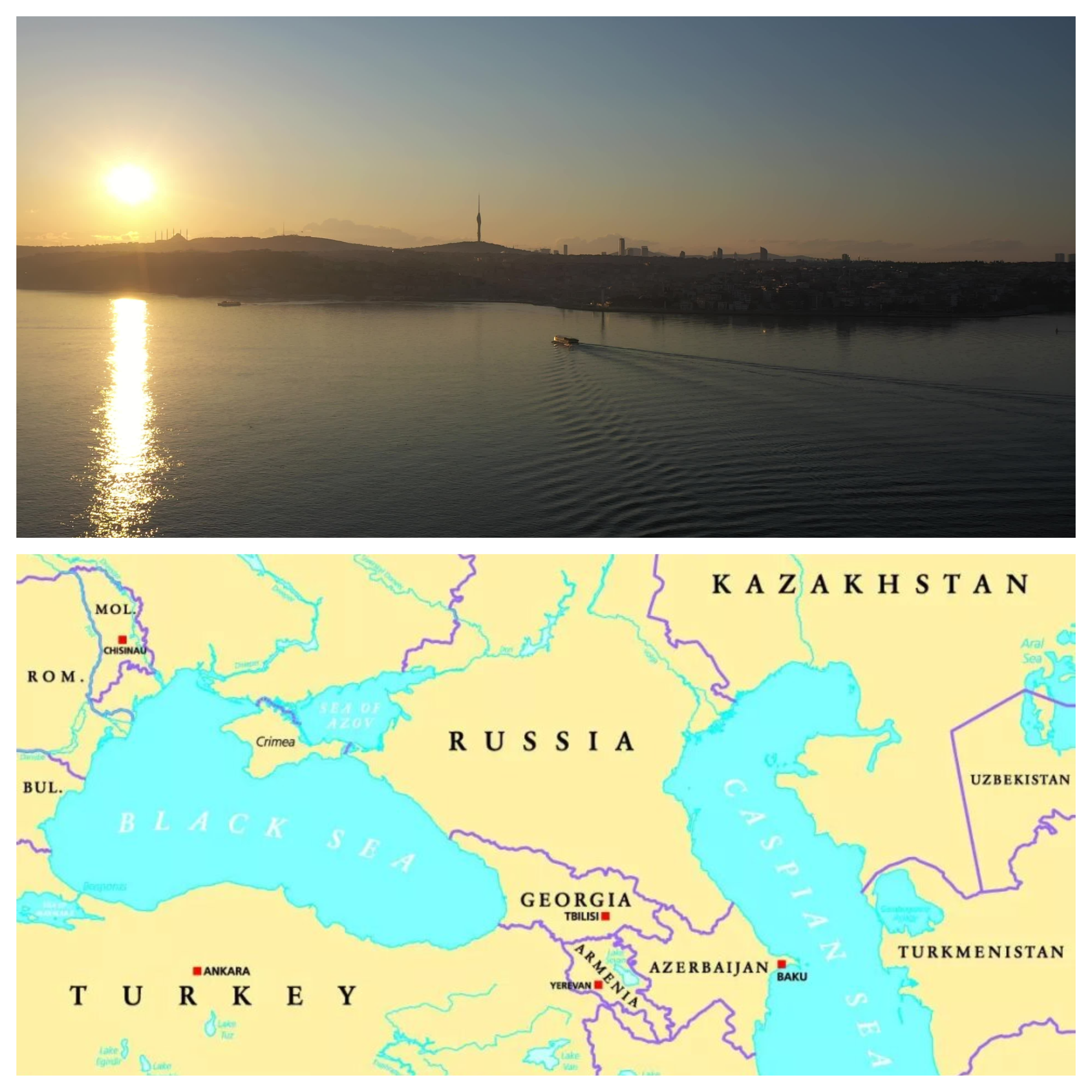 AT THE CROSSROADS: TÜRKİYE AND THE BATTLE FOR BLACK SEA ORDER
AT THE CROSSROADS: TÜRKİYE AND THE BATTLE FOR BLACK SEA ORDER
Teoman Ertuğrul TULUN 21.10.2025
-
25.01.2016
THE ARMENIAN QUESTION - BASIC KNOWLEDGE AND DOCUMENTATION -
12.06.2024
THE TRUTH WILL OUT -
27.03.2023
RADİKAL ERMENİ UNSURLARCA GERÇEKLEŞTİRİLEN MEZALİMLER VE VANDALİZM -
17.03.2023
PATRIOTISM PERVERTED -
23.02.2023
MEN ARE LIKE THAT -
03.02.2023
BAKÜ-TİFLİS-CEYHAN BORU HATTININ YAŞANAN TARİHİ -
16.12.2022
INTERNATIONAL SCHOLARS ON THE EVENTS OF 1915 -
07.12.2022
FAKE PHOTOS AND THE ARMENIAN PROPAGANDA -
07.12.2022
ERMENİ PROPAGANDASI VE SAHTE RESİMLER -
01.01.2022
A Letter From Japan - Strategically Mum: The Silence of the Armenians -
01.01.2022
Japonya'dan Bir Mektup - Stratejik Suskunluk: Ermenilerin Sessizliği -
03.06.2020
Anastas Mikoyan: Confessions of an Armenian Bolshevik -
08.04.2020
Sovyet Sonrası Ukrayna’da Devlet, Toplum ve Siyaset - Değişen Dinamikler, Dönüşen Kimlikler -
12.06.2018
Ermeni Sorunuyla İlgili İngiliz Belgeleri (1912-1923) - British Documents on Armenian Question (1912-1923) -
02.12.2016
Turkish-Russian Academics: A Historical Study on the Caucasus -
01.07.2016
Gürcistan'daki Müslüman Topluluklar: Azınlık Hakları, Kimlik, Siyaset -
10.03.2016
Armenian Diaspora: Diaspora, State and the Imagination of the Republic of Armenia -
24.01.2016
ERMENİ SORUNU - TEMEL BİLGİ VE BELGELER (2. BASKI)
-
AVİM Conference Hall 24.01.2023
CONFERENCE TITLED “HUNGARY’S PERSPECTIVES ON THE TURKIC WORLD"









